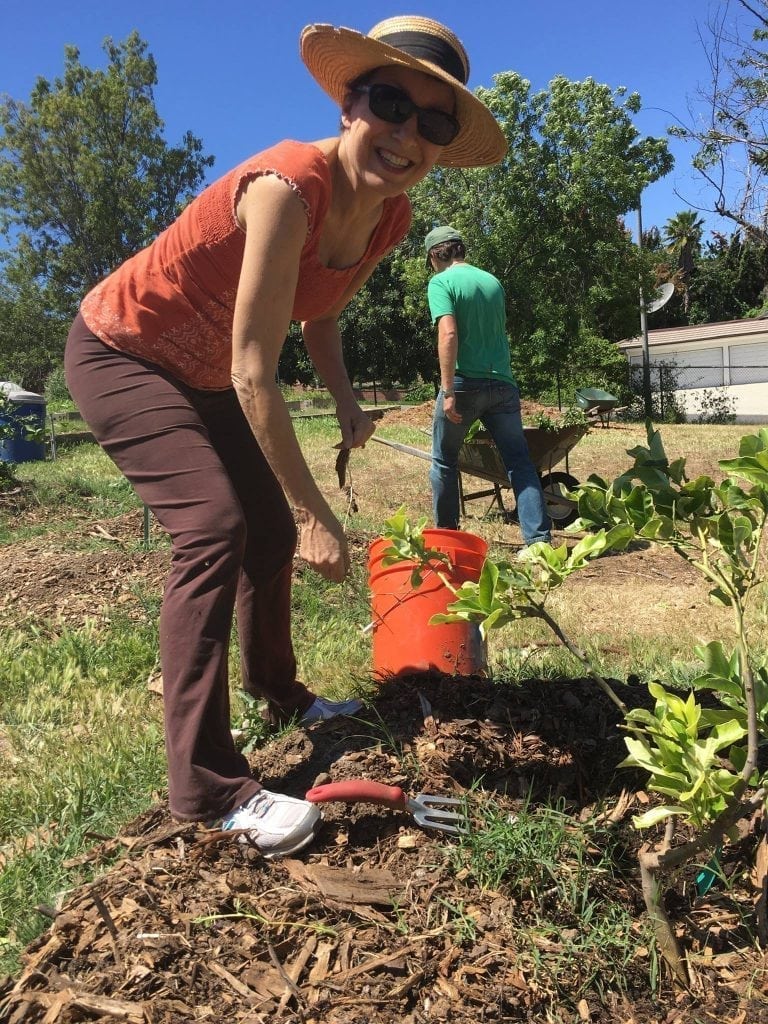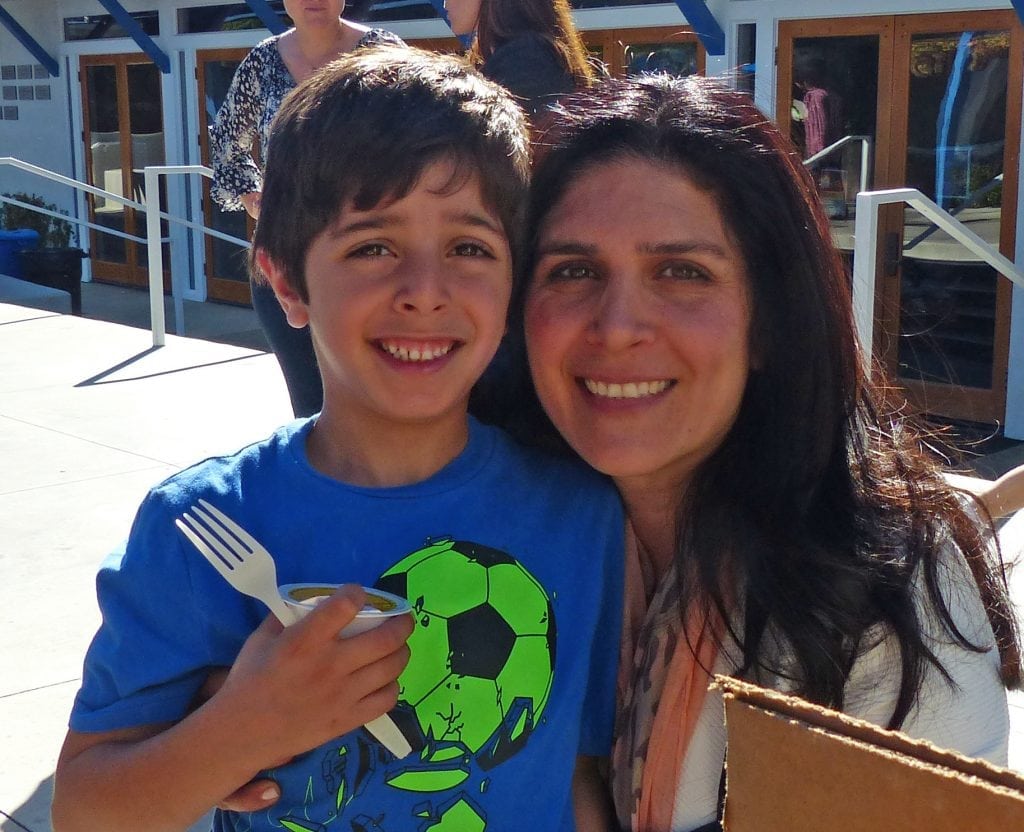
During Highland Hall’s Thursday morning Craft Circle, parents make crafts to be sold at the school’s boutique and fairs. PHOTO COURTESY HIGHLAND HALL WALDORF SCHOOL
Local campuses offer a host of classes and activities for moms and dads of students.
Cara Lisco doesn’t expect to become a top-notch knitter or dancer by taking weekly classes at Highland Hall Waldorf School, where her three children are students. The knitting and eurythmy classes are among enrichment activities offered to parents of students who attend the Northridge private school. They are designed to help parents like Lisco have fun and gain insight.
“When I learned how to knit in a weekly parenting class, I finally understood why knitting supports left brain/right brain neurological development that is essential as a foundation for reading skills,” Lisco says. And she is especially proud of a little rabbit named “Boo Boo Bunny” that she knitted and that her family keeps in a drawer with the bandages.
Highland Hall’s roster of enrichment classes and programs for parents also includes tango, meditation, garden work parties and an educational lecture series. “Highland Hall offers workshops and classes throughout the year for our parents and community members to enjoy and gain an understanding of our developmental approach to education,” says Meredith Cornelius, who handles marketing and development for the school.
A weekly craft circle begins right after morning drop-off and is a great way to make new friends while learning to create beautiful Waldorf-inspired crafts, says Cornelius. The crafts are sold at community events and funds are donated to the parent association.
A Fun Bonus
Highland Hall is one of several private schools that are going beyond educating and enriching their students, and reaching out to do the same for parents with a range of classes, workshops and support groups. Some are offered free; others for a nominal fee.
“We’re seeing an increase in schools that are offering parents more of an opportunity to become involved in fun activities like book groups, self-defense classes or yoga. These types of activities have other advantages in that they promote a sense of community and connection among the parent body at the school,” says Los Angeles psychologist and educational consultant Michelle Nitka, Ph.D, author of “Coping With Preschool Panic.” “Although I would not go so far as to pick a school solely based on these enrichment activities, I would say they do bring an added bonus to being part of that school’s community,” she adds.

Parents take on weeding, composting and planting during Highland Hall’s weekend garden work parties on its farm. PHOTO COURTESY HIGHLAND HALL WALDORF SCHOOL
Monday morning meditation at her children’s wooded Highland Hall campus helps Lisco stay grounded, especially after driving her brood to school through L.A. traffic. On these hectic mornings, she meets up with fellow parents to gather in a circle on blankets on a platform outdoors when the weather is nice and indoors when it rains. The mood is light and bubbly with conversation until the group leader shares a poem or inspirational message before lighting a candle in the center of the circle.
“It reminds me that a calm center becomes a sturdy foundation to enable positive interactions with others, to be receptive to effective ideas and to be able to continue to grow and self-cultivate,” says Lisco, whose children are 6, 9 and 13.
Offering parents enriching experiences on their child’s campus also eliminates scheduling hassles. “Parenting can be an overwhelming experience,” says Randi Abramowitz, director of parent and enrichment programming at 807 Enrichment Center at Piper Preschool in Santa Monica. “Having a convenient place to regroup, disconnect and take care of ourselves is a great resource for everyone.” Piper offers monthly Parenting for Parents classes and themed one-time classes.
Learning Together
Campbell Hall in Studio City also offers guided meditation sessions, which kick start the school’s free Parent Mindfulness Group that meets Tuesday mornings from September through May. “Meditation is followed by topics such as authentic parenting, connecting more deeply with our kids and development of skills, all while building community with fellow parents,” says Sarah Huss, director of human development and parent education at Campbell Hall. “Parents learn from the person facilitating and from other parents.”
Campbell Hall also offers a parent education program of lectures and workshops that bring together parents and other members of the community with experts in a variety of fields. Offered mornings and evenings from September through March, the program explores topics such as technology and ethics, childhood stress and anxiety and health and wellness. Speakers typically discuss their topic for about an hour and then encourage questions.
The annual “Fatherhood Dialogues,” led by therapist Gary M. Groch, Ph.D. , has been available to Campbell Hall dads for the past 13 years. They discuss the joys and challenges of parenthood, share their experiences and enjoy a light meal. “The idea for this event came about from a combination of my own experiences as a father and my work with fathers as a psychotherapist,” says Groch, father of two grown daughters. The evening typically begins with small plates of cheese, crackers and vegetables as well as refreshments. This year, beer joins the menu, chuckles Groch.
He usually opens the meeting with a description of how dads are often viewed as less competent parents than moms. Groch assures dads that their role is different but equally important. “These are normal experiences but most dads don’t talk about it,” says Groch, who describes himself as Campbell Hall’s school shrink. The group is quiet at first, but the dads soon open up and fathers of older kids offer suggestions and practical advice to the more novice parents. “It begins to feel very supportive. By the end there’s usually a feeling of buoyancy, a feeling of community. There’s a feeling of caring when dads are giving each other advice. That’s where the real value comes,” says Groch.
Building Community
For Ronit Gravori, whose sons are 7, 9 and 12, parent programs at the Mirman School strengthen her confidence as a parent and help her connect to fellow parents at the multicultural Bel-Air campus. “Parents learn from each other as we share our own personal stories,” Gravori says. “We see that we are not alone in our challenges. As a community we form a safety net for each other’s children, cultivating an environment that fosters each child’s potential.”

Ronit Gravori attends parent education groups and events at Mirman School, where her three sons are students. PHOTO BY VIVIAN ZACHARY
Mirman’s parent education group features experts, authors and community advocates who discuss various parenting styles. The Tuesday morning sessions have helped Gravori develop a deeper connection with her children. She also attends the Friday morning Inter-Cultural Discussion Group (ICDG), where discussions revolve around differences in ethnicity, race, religion, lifestyle and socioeconomic status.
ICDG provides a safe place for parents from various racial and religious groups and ZIP codes to share their concerns and goals for raising their children in a culturally diverse society while retaining their own family’s beliefs and values. “We are very driven by inclusivity and equity work and consider this a priority and ongoing process,” says Mirman School Psychologist and Administrator Dena Scott, who facilitates Mirman’s parent programs.
ICDG has been an enlightening experience for Gravori, a first-generation American of Turkish and Israeli descent. She finds there is more depth to people than what you see, and that sharing personal stories has helped her learn about herself. “It’s interesting for me to see my journey in life and how I got to where I am. My life story has impacted my parenting,” says Gravori. “I want my kids to experience life.”
Whether parents meet in craft and meditation classes or in parenting and support groups, shared experiences unite them. “It’s where friendships are made, says Marisa Cody, a mom and craft teacher at Highland Hall, where her 12-year-old is a student. “We all come to rely on each other for parenting advice, healthy recipes and sometimes just a shoulder to lean on.”
Mimi Slawoff is an L.A.-area mom of three and a frequent contributor to L.A. Parent.


























